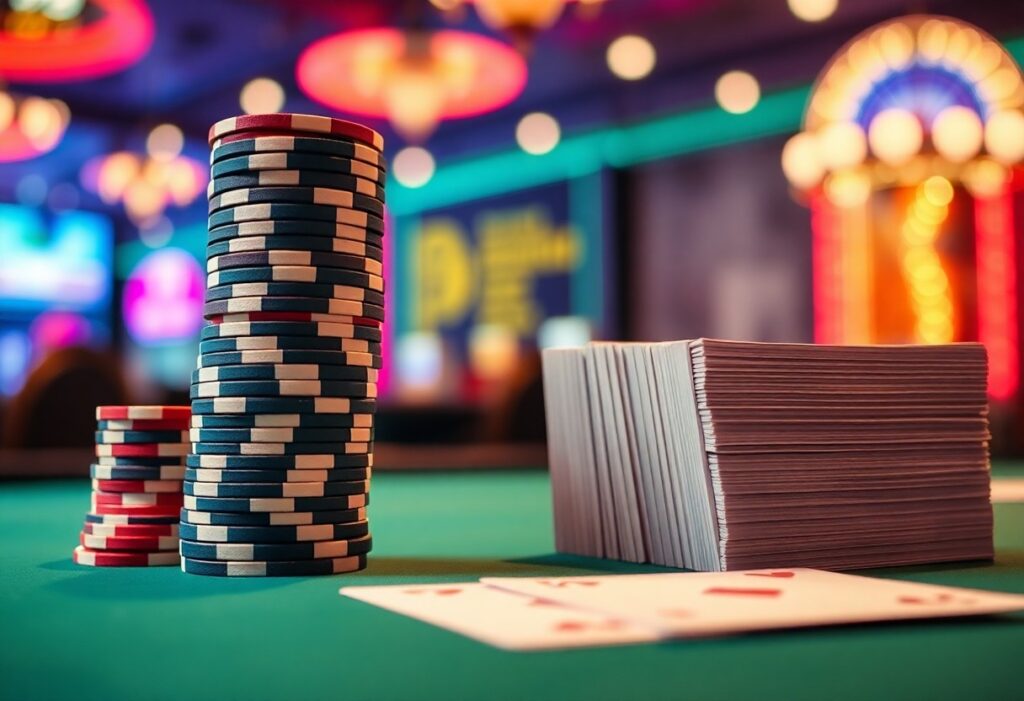
Many players grapple with the tension between luck and skill in casino poker games. Understanding this dynamic is vital for developing a winning strategy. While luck can sway the outcome of individual hands, consistent success in poker relies on honing your skills, mastering strategies, and reading opponents. Striking the right balance allows players to navigate the unpredictable nature of the game while maximizing their potential for long-term profitability. This guide will help you explore how to harness both elements effectively.
Types of Poker Games
Understanding the different types of poker games is key to mastering this skill-based game. Each variant offers unique rules and strategies that can affect both luck and skill. Here’s a quick overview:
| Type | Description |
|---|---|
| Cash Games | Real money is at stake, and players can join or leave at any time. |
| Tournament Play | Players buy-in for a set amount and compete for a prize pool. |
| Heads-Up | Only two players compete against each other. |
| Short-Handed | Typically involves 6-9 players at the table. |
| Full Ring | Involves 9 or 10 players at the table. |
After exploring the types of games, we can examine them more closely, starting with cash games.
Cash Games
Cash games are the most straightforward form of poker, allowing players to buy in for real money and play with chips of equal value. Players can leave the table whenever they wish, making this format appealing for both casual players and veterans. The flexibility offers players the chance to control their time, bankroll, and strategies, all while facing different opponents.
Tournament Play
Tournament play presents a different challenge, as players pay a set buy-in and compete for a prize pool rather than cashing out their chips during the game. Players are eliminated as they lose all their chips, with the catch being that the skill of managing chip stacks, understanding payout structures, and navigating blind levels become significant factors in success. This format requires not just gameplay skill but also long-term strategic thinking.
In tournament play, participants experience an escalating structure as blinds increase, requiring careful management of resources. The competition gets fiercer as players strategize around others, observing their betting patterns and adjusting tactics accordingly. Close to reaching the money bubble, the dynamics change as players tighten their strategies to secure a payout. In the final table, the stakes rise, and pressure mounts, making the mix of skill and psychological elements imperative for victory. Understanding the various stages and adapting to different player styles can greatly enhance one’s chances of success.
Factors Influencing Luck and Skill
In casino poker, both luck and skill play vital roles, but their impact can vary greatly based on several factors:
- Game type and structure
- Player experience and knowledge
- Psychological elements and emotional state
- Variability of hands dealt during play
- Table dynamics and opponent behavior
Perceiving these influences allows players to adapt their strategies effectively.
Randomness in Game Outcomes
Each hand of poker is subject to randomness, with a shuffled deck resulting in unpredictable outcomes. This inherent variability can lead to unpredictable wins or losses, regardless of a player’s skill level. Over numerous hands, the effect of randomness tends to balance out, but short-term swings can skew player perceptions of their own abilities.
Player Decision-Making
Decision-making in poker is often a blend of analysis and intuition. Players must assess their cards, evaluate opponents’ behaviors, and weigh the probability of different outcomes. This involves not only mathematical calculations about pot odds and expected value but also psychological insights into their opponents’ tendencies. A skilled player will capitalize on these observations to make aggressive plays that exploit opponents’ weaknesses, navigating through the game’s innate uncertainties.
Tips for Balancing Luck and Skill
Balancing luck and skill in poker requires conscious effort and strategic thinking. Start by honing your game knowledge and understanding the odds, as this will empower your decisions. Practice adaptability to shift your strategy based on changing dynamics at the table. Additionally, pay attention to your opponents’ behaviors and tendencies. Build a solid poker strategy that incorporates both risk management and aggressive play when advantageous. Assume that maintaining this balance is an ongoing journey that evolves with experience.
Developing a Strategy
Creating a successful strategy involves understanding the intricacies of each poker variant you encounter. Focus on hand selection, position at the table, and adjusting your play based on opponents. Analyze your past performances to identify patterns and refine your approach. Incorporate techniques like bluffing and pot odds into your game, ensuring that you’re making informed decisions rather than relying solely on luck.
Managing Emotions and Bankroll
Effective bankroll management is important in poker to withstand variance and emotional fluctuations. Set strict limits on the amount you are willing to risk and stick to them, regardless of the game’s outcome. Recognize when emotions run high during both winnings and losses, as they can cloud your judgment. Taking regular breaks can restore focus and help maintain a clear mindset.
Maintaining emotional control and managing your bankroll can significantly influence your long-term success in poker. Many players make the mistake of chasing losses or betting recklessly when feeling overconfident, which often leads to financial decline. Sticking to a pre-defined bankroll strategy, like the 1-2% rule—only risking 1-2% of your total funds in a single session—can safeguard your investment. Regularly assess your emotional state and practice stress management techniques to ensure you’re playing at your best. Ultimately, master both your emotions and your money to achieve a more sustainable poker career.
Step-by-Step Guide to Improving Your Game
| Step | Description |
|---|---|
| Learning the Rules | Understand the basic rules of poker, including hand rankings and betting structures, to build a solid foundation. |
| Practicing Essential Skills | Develop critical skills like hand reading and bluffing to enhance your strategic approach to the game. |
Learning the Rules
Familiarizing yourself with the rules of poker is the first step in elevating your gameplay. Knowing the hand rankings, the different betting rounds, and the specific rules for the variant you’re playing, such as Texas Hold’em or Omaha, ensures you can make informed decisions at the table. This foundational knowledge not only prevents costly mistakes but also boosts your confidence as you engage in more complex strategies.
Practicing Essential Skills
To gain a competitive edge in poker, honing imperative skills is indispensable. Focus on areas such as hand reading, where understanding opponents’ actions can provide insights into their potential holdings. Bluffing, when executed strategically, can also be a powerful tool to manipulate opponents and gain an advantage.
Practice hand reading by reviewing hands after each session, paying attention to betting patterns and timing. Utilize online poker software for simulations that focus on specific skills like calculating odds or practicing optimal betting strategies. Creating scenarios where you can analyze various outcomes helps transform theoretical knowledge into practical skills, giving you confidence in real-game situations.
Pros and Cons of Luck in Poker
| Pros | Cons |
|---|---|
| Can level the playing field between novice and expert players | May lead to poor decision-making if over-relied upon |
| Creates excitement and unpredictability in games | Can discourage skill development and strategic play |
| Favors those who take risks, rewarding bold plays | Can skew results in short-term scenarios |
| Encourages social interactions and camaraderie | May cultivate unrealistic expectations for consistent wins |
| Enhances the thrill of the game for recreational players | Can frustrate experienced players when luck is not on their side |
Advantages of Luck
Luck in poker can significantly level the playing field, allowing less experienced players to occasionally win against seasoned veterans. It brings excitement and unpredictability to each hand, ultimately making the game more thrilling. Players who embrace risk-taking often find that a dose of luck can turn the tides in their favor, leading to unexpected victories that enhance the overall enjoyment of the game.
Disadvantages of Reliance on Luck
Over-reliance on luck can undermine the development of important poker skills. While luck might yield short-term success, it generally leads to poor strategic choices. Players who focus excessively on fortunate outcomes may neglect to refine their decision-making or analytical abilities, ultimately limiting their growth as competitors.
Furthermore, relying too heavily on luck without mastering the fundamentals can result in significant monetary losses. Players may launch on unrealistic winning streaks fueled by luck, leading to inflated confidence. When such players encounter a downturn, the subsequent frustration can cause them to abandon strategic play altogether. Balancing skill with the inevitable role of luck becomes vital to achieving long-term success in poker.
Pros and Cons of Skill in Poker
| Pros | Cons |
|---|---|
| Increased winning potential over time | Higher pressure to constantly perform |
| Ability to outplay less skilled opponents | Dependency on emotional resilience |
| Enhanced decision-making skills | Risk of overconfidence leading to mistakes |
| Possibility of consistent profit margins | Greater target for scrutiny and exploitation |
| Deep understanding of game theory | Time investment required for mastery |
Advantages of Skill-Based Play
Skill-based play in poker provides a significant advantage as it allows players to make calculated decisions, assess risks accurately, and maximize their winnings consistently. Seasoned players often demonstrate a deep understanding of statistics, probabilities, and psychology, enabling them to read opponents effectively and adjust their strategies accordingly. This expertise transforms poker from a mere game of chance into a disciplined battle of wits where skill can overpower luck in the long run.
Challenges Faced by Skilled Players
Despite their advantages, skilled players encounter several challenges that can undermine their effectiveness. They must deal with the psychological pressure of maintaining high performance while facing varying levels of competition, which can lead to emotional exhaustion. Additionally, skilled players often become targets for less experienced opponents, who may adopt erratic strategies that disrupt the predictable nature of their gameplay, making it difficult to adapt and adjust.
Moreover, as skilled players rise in ranks, they inevitably confront increased scrutiny. Opponents may study their playing style intensely, searching for weaknesses to exploit. This environment creates an ongoing pressure to innovate and adapt continuously, keeping their strategies fresh and unpredictable. Financial implications also arise; skilled players often face higher stakes and greater expectations, which can complicate their approach to risk management. These dynamics can contribute to a heightened sense of stress and performance anxiety, ultimately impacting their overall game. Balancing skill with an awareness of these challenges is vital for sustained success in the competitive arena of poker.
Summing up
Conclusively, success in casino poker games hinges on a careful balance between luck and skill. While favorable cards can provide temporary advantages, a player’s understanding of strategy, probability, and psychological factors ultimately determines long-term success. Emphasizing skill development through practice and analysis can mitigate the role of chance, allowing players to navigate the inherent uncertainties of the game effectively. Striking this equilibrium not only enhances gameplay but also promotes a deeper appreciation of poker as a blend of both fortune and expertise.
FAQ
Q: How does luck influence the outcome of a poker game?
A: Luck plays a significant role in poker, particularly in the short term. It involves the random distribution of cards, which can yield favorable or unfavorable hands. While skilled players can optimize their strategy based on probabilities, the inherent unpredictability of shuffling means that luck can heavily impact individual hands, leading to unexpected outcomes.
Q: Can skill overcome luck in the long run during poker games?
A: Yes, skill can significantly outweigh luck over a large number of hands. Skilled players utilize strategies such as understanding odds, reading opponents, and managing their bankroll effectively. Over time, these advantages typically result in better decision-making, allowing skilled players to consistently outperform less experienced competitors despite any short-term luck variations.
Q: How can players strike a balance between luck and skill in poker?
A: Players can strike a balance by focusing on their strategic development while acknowledging the role of chance. This includes honing their skills through practice, studying game mechanics, and analyzing past performances. Emphasizing patience and adaptability allows players to better navigate the uncertainty of luck while maximizing the impact of their skill set during games.



